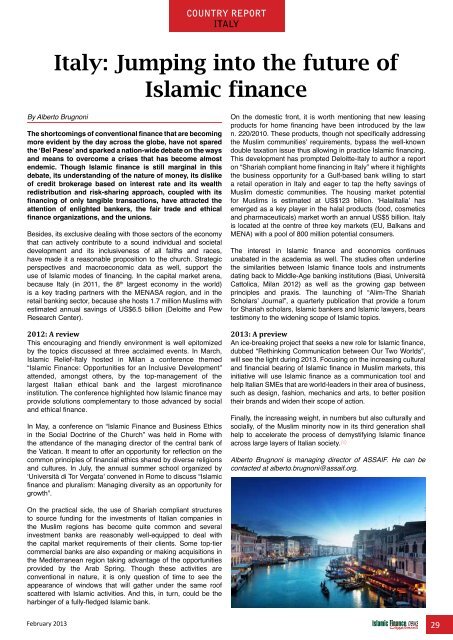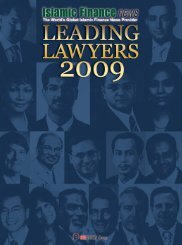View PDF Edition - Islamic Finance News
View PDF Edition - Islamic Finance News
View PDF Edition - Islamic Finance News
Create successful ePaper yourself
Turn your PDF publications into a flip-book with our unique Google optimized e-Paper software.
country report<br />
ITALY<br />
Italy: Jumping into the future of<br />
<strong>Islamic</strong> finance<br />
By Alberto Brugnoni<br />
The shortcomings of conventional finance that are becoming<br />
more evident by the day across the globe, have not spared<br />
the ‘Bel Paese’ and sparked a nation-wide debate on the ways<br />
and means to overcome a crises that has become almost<br />
endemic. Though <strong>Islamic</strong> finance is still marginal in this<br />
debate, its understanding of the nature of money, its dislike<br />
of credit brokerage based on interest rate and its wealth<br />
redistribution and risk-sharing approach, coupled with its<br />
financing of only tangible transactions, have attracted the<br />
attention of enlighted bankers, the fair trade and ethical<br />
finance organizations, and the unions.<br />
Besides, its exclusive dealing with those sectors of the economy<br />
that can actively contribute to a sound individual and societal<br />
development and its inclusiveness of all faiths and races,<br />
have made it a reasonable proposition to the church. Strategic<br />
perspectives and macroeconomic data as well, support the<br />
use of <strong>Islamic</strong> modes of financing. In the capital market arena,<br />
because Italy (in 2011, the 8 th largest economy in the world)<br />
is a key trading partners with the MENASA region, and in the<br />
retail banking sector, because she hosts 1.7 million Muslims with<br />
estimated annual savings of US$6.5 billion (Deloitte and Pew<br />
Research Center).<br />
2012: A review<br />
This encouraging and friendly environment is well epitomized<br />
by the topics discussed at three acclaimed events. In March,<br />
<strong>Islamic</strong> Relief-Italy hosted in Milan a conference themed<br />
“<strong>Islamic</strong> <strong>Finance</strong>: Opportunities for an Inclusive Development”<br />
attended, amongst others, by the top-management of the<br />
largest Italian ethical bank and the largest microfinance<br />
institution. The conference highlighted how <strong>Islamic</strong> finance may<br />
provide solutions complementary to those advanced by social<br />
and ethical finance.<br />
In May, a conference on “<strong>Islamic</strong> <strong>Finance</strong> and Business Ethics<br />
in the Social Doctrine of the Church” was held in Rome with<br />
the attendance of the managing director of the central bank of<br />
the Vatican. It meant to offer an opportunity for reflection on the<br />
common principles of financial ethics shared by diverse religions<br />
and cultures. In July, the annual summer school organized by<br />
‘Università di Tor Vergata’ convened in Rome to discuss “<strong>Islamic</strong><br />
finance and pluralism: Managing diversity as an opportunity for<br />
growth”.<br />
On the domestic front, it is worth mentioning that new leasing<br />
products for home financing have been introduced by the law<br />
n. 220/2010. These products, though not specifically addressing<br />
the Muslim communities’ requirements, bypass the well-known<br />
double taxation issue thus allowing in practice <strong>Islamic</strong> financing.<br />
This development has prompted Deloitte-Italy to author a report<br />
on “Shariah compliant home financing in Italy” where it highlights<br />
the business opportunity for a Gulf-based bank willing to start<br />
a retail operation in Italy and eager to tap the hefty savings of<br />
Muslim domestic communities. The housing market potential<br />
for Muslims is estimated at US$123 billion. ‘Halalitalia’ has<br />
emerged as a key player in the halal products (food, cosmetics<br />
and pharmaceuticals) market worth an annual US$5 billion. Italy<br />
is located at the centre of three key markets (EU, Balkans and<br />
MENA) with a pool of 800 million potential consumers.<br />
The interest in <strong>Islamic</strong> finance and economics continues<br />
unabated in the academia as well. The studies often underline<br />
the similarities between <strong>Islamic</strong> finance tools and instruments<br />
dating back to Middle-Age banking institutions (Biasi, Università<br />
Cattolica, Milan 2012) as well as the growing gap between<br />
principles and praxis. The launching of “Alim-The Shariah<br />
Scholars’ Journal”, a quarterly publication that provide a forum<br />
for Shariah scholars, <strong>Islamic</strong> bankers and <strong>Islamic</strong> lawyers, bears<br />
testimony to the widening scope of <strong>Islamic</strong> topics.<br />
2013: A preview<br />
An ice-breaking project that seeks a new role for <strong>Islamic</strong> finance,<br />
dubbed “Rethinking Communication between Our Two Worlds”,<br />
will see the light during 2013. Focusing on the increasing cultural<br />
and financial bearing of <strong>Islamic</strong> finance in Muslim markets, this<br />
initiative will use <strong>Islamic</strong> finance as a communication tool and<br />
help Italian SMEs that are world-leaders in their area of business,<br />
such as design, fashion, mechanics and arts, to better position<br />
their brands and widen their scope of action.<br />
Finally, the increasing weight, in numbers but also culturally and<br />
socially, of the Muslim minority now in its third generation shall<br />
help to accelerate the process of demystifying <strong>Islamic</strong> finance<br />
consulting www.<strong>Islamic</strong><strong>Finance</strong>Consulting.com<br />
www.<strong>Islamic</strong><strong>Finance</strong>Events.com<br />
across large layers of Italian society.<br />
www.<strong>Islamic</strong><strong>Finance</strong><strong>News</strong>.com<br />
www.<strong>Islamic</strong><strong>Finance</strong>Training.com<br />
www.MIFforum.com<br />
www.MIFmonthly.com<br />
www.MIFtraining.com<br />
www.REDmoneyBooks.com<br />
Alberto Brugnoni is managing director of ASSAIF. He can be<br />
contacted at alberto.brugnoni@assaif.org.<br />
On the practical side, the use of Shariah compliant structures<br />
to source funding for the investments of Italian companies in<br />
the Muslim regions has become quite common and several<br />
investment banks are reasonably well-equipped to deal with<br />
the capital market requirements of their clients. Some top-tier<br />
commercial banks are also expanding or making acquisitions in<br />
the Mediterranean region taking advantage of the opportunities<br />
provided by the Arab Spring. Though these activities are<br />
conventional in nature, it is only question of time to see the<br />
appearance of windows that will gather under the same roof<br />
scattered with <strong>Islamic</strong> activities. And this, in turn, could be the<br />
harbinger of a fully-fledged <strong>Islamic</strong> bank.<br />
February 2013 29
















